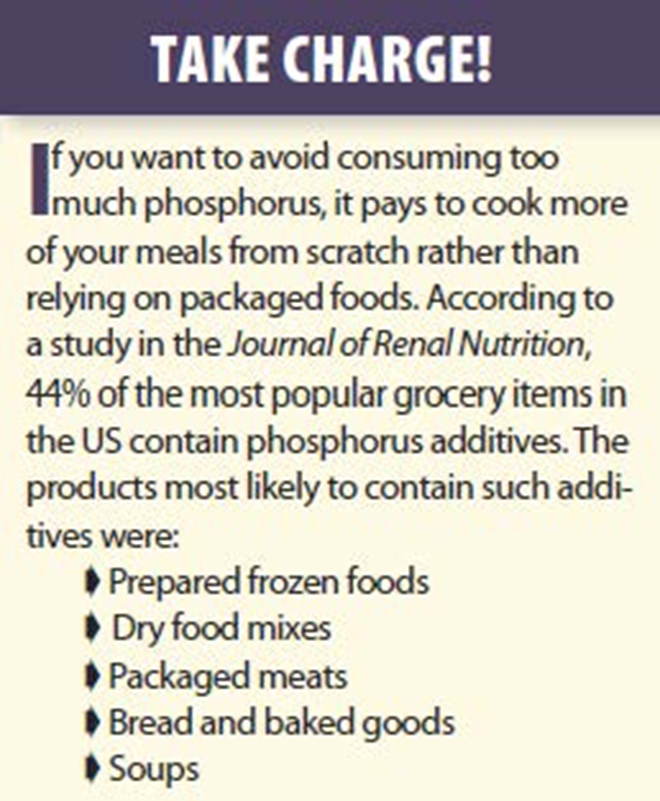Phosphorus, a mineral found in foods such as meat and milk, is important for forming bones and teeth, making proteins for healthy cells, and transporting cellular energy. But too much of a good thing can be harmful among people with kidney disease, and a new study suggests excess phosphorus consumption is associated with increased mortality risk, even in people with normal kidney function.

The danger of too much dietary phosphorus may be on the rise because of the growing popularity of phosphorus-based additives in packaged foods. These phosphate compounds are employed as preservatives, anti-caking agents, stabilizers, leavening agents and acidifiers. A second study (see box) recently reported that nearly half of the best-selling grocery products in the United States contain phosphorus additives. In an analysis of dietary data, more than one-third of American adults were found to consume in excess of 1,400 milligrams of phosphorus daily-double the RDA and apparently enough to increase their mortality risk.
When intake of phosphorus chronically exceeds nutrient needs, there is a disruption in the endocrine regulation of phosphorus balance, explains Madhumathi Rao, MD, an assistant professor at Tufts University School of Medicine. A trade-off takes place, with the elevation of hormones that force the excretion of phosphorus by the kidney, but at the expense of the effects of these hormones on tissues. The consequences are calcium deposition in the blood vessels, enlargement of the heart, bone loss and progression of kidney disease. While these consequences are readily apparent in individuals with kidney disease often in the setting of abnormally elevated serum phosphorus, they are also seen in healthy individuals without an overt elevation of serum phosphorus.

ADDITIVES ADD UP: The latest study, published in the American Journal of Clinical Nutrition, looked at data on 9,686 healthy US adults, ages 20 to 80, who participated in a national nutrition survey (NHANES III). Over a followup period of 12 to 18 years, those whose diets meant they consumed more than 1,400 milligrams of phosphorus daily were at increased risk of dying from any cause.
Because of the prevalence of high phosphorus intake in healthy adults and the widespread use of inorganic phosphorus additives in processed food, our findings may have… public health implications, concluded Alex R. Chang, MD, of Geisinger Health System, and colleagues.
Some experts believe that even those high levels of phosphorus consumption are understated, because its difficult for calculations to account for all food additives. Food manufacturers do not always supply complete information on such additives. On food labels, these appear as ingredients with the word phosphate or ending in-phosphate, as well as phosphoric acid.
People are not generally aware of the importance of avoiding phosphorus overload or of the need to inspect food labels more carefully, says Tufts Dr. Rao. Poor quality foods and fast foods, often consumed by individuals with lower socioeconomic status, have the highest phosphorus content from food additives.
























